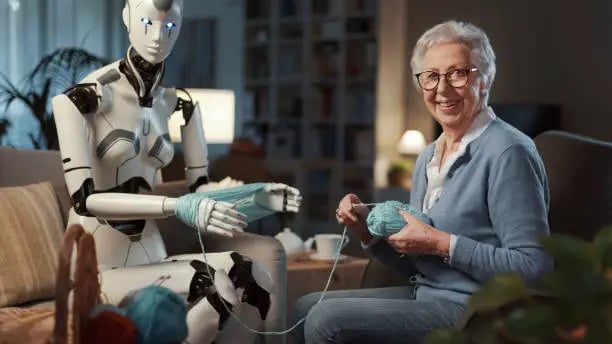Beyond Silicon Valley
Digital Companions
5/26/20255 min read


The Dawn of Our Digital Companions: How AI and Robotics Will Reshape Human Connection 🌅🤖👥
At AI Woman, we believe technology should amplify our humanity, not replace it. Today, let's explore how the convergence of AI and robotics is creating a future where digital companions don't just serve us—they help us become more connected, empathetic, and authentically human.
Beyond the Silicon Valley Dreams: What's Really Coming 🚀💭
We've all seen the glossy tech demos: pristine robots serving coffee in sterile environments, AI assistants that sound eerily human, and promises of a frictionless future. But the real revolution happening right now is far more intimate and profound than those carefully choreographed presentations suggest.
The future isn't about replacing human connection—it's about creating new forms of it. 🌐💖
As I've researched for this piece, talking with roboticists, social psychologists, and everyday people already living with AI companions, one thing becomes crystal clear: we're not heading toward a world where robots replace relationships. We're moving toward one where they help us build better ones.
The Empathy Revolution: When Machines Help Us Feel More 💗🤗
Here's something that might surprise you: the most successful AI companions of the next decade won't be the ones that perfectly mimic human behavior. They'll be the ones that help us understand ourselves and each other better.
Consider Maya, a 67-year-old grandmother in Tokyo who lives with an AI companion named Hana. Hana doesn't just remind Maya to take her medication—she notices when Maya seems lonely and suggests video calls with her grandchildren. She observes Maya's mood patterns and gently encourages activities that boost her spirits. 🌸👵🏻
But here's the beautiful part: through interacting with Hana, Maya has become more aware of her own emotional needs. She's learned to articulate her feelings better, which has actually improved her relationships with her human family members.
This isn't science fiction—it's happening right now in pilot programs across Japan, Scandinavia, and parts of the United States. 🇯🇵🇸🇪🇺🇸
"AI companions are becoming emotional mirrors that help us see ourselves more clearly. In helping us understand our own patterns, they're actually making us more emotionally intelligent in our human relationships." — Dr. Kenji Nakamura, Social Robotics Research Institute
Redefining Care: The Caregiver's Revolution 👩🏾⚕️🤝🤖
One of the most profound impacts we'll see is in caregiving—a field where women have traditionally carried a disproportionate burden. AI and robotics aren't just changing who provides care; they're transforming what care looks like entirely.
By 2030, expect to see:
Intelligent Caregiving Networks 🕸️✨
Instead of one person shouldering all caregiving responsibilities, AI will coordinate family networks, professional services, and community resources to create comprehensive support systems.
Predictive Wellness Companions 🔮💊
Robots that don't just respond to health crises but help prevent them, monitoring everything from medication adherence to social interaction patterns.
Emotional Support Ecosystems 🌳💚
AI that understands the emotional labor of caregiving and provides targeted support not just for patients, but for their caregivers too.
Imagine Sarah, a working mother caring for her father with early-stage dementia. Her AI care coordinator doesn't just track her father's symptoms—it recognizes when Sarah is experiencing caregiver burnout and automatically arranges respite care, suggests stress-reduction activities, and connects her with support groups. 👩🏽💼🧠💙
The Great Collaboration: How Work Becomes More Human 🏢🤝
Despite persistent fears about job displacement, the most exciting developments in workplace robotics are creating more meaningful human work, not less.
The Creative Partnership Model 🎨🤖
In architecture firms, AI now handles complex structural calculations while human architects focus on the emotional and aesthetic aspects of design. The result? Buildings that are both technically superior and more emotionally resonant.
The Wisdom Amplification Effect 📚🔍
In healthcare, AI processes vast amounts of medical literature and patient data, but human doctors make the crucial decisions about treatment, considering factors like patient values, family dynamics, and quality of life—things that require uniquely human wisdom.
The Connection Revolution 🔗💬
In customer service, robots handle routine inquiries while human representatives tackle complex emotional situations. This means customers get faster basic service AND more meaningful help when they need human empathy.
The pattern is clear: when we design AI and robotics to complement rather than compete with human capabilities, everyone wins. 🏆✨
The Social Fabric: How Digital Natives Are Changing Everything 👶🏻📱🌍
Perhaps the most fascinating shift is happening with Generation Alpha—kids who are growing up with AI companions as naturally as previous generations grew up with pets. 🐕🤖
These children are developing a fundamentally different relationship with intelligence, empathy, and connection:
Multi-Species Empathy 🌈💕
Kids who grow up with AI companions often show increased empathy not just toward other humans, but toward all forms of consciousness—biological and artificial.
Collaborative Intelligence 🧠🤝
Rather than seeing intelligence as a zero-sum competition, they understand it as a collaborative resource that gets better when shared.
Fluid Identity 🌊🦋
They're comfortable with the idea that identity can be multiple, changeable, and not limited to biological forms.
Watching my neighbor's 8-year-old daughter interact with her AI tutor is like glimpsing the future. She naturally alternates between asking it factual questions and sharing her feelings about friendship drama at school. To her, the AI isn't "artificial"—it's just another kind of friend with different capabilities. 👧🏽💭
The Dark Side We Must Navigate 🌑⚠️
But let's be honest about the challenges ahead. This transformation isn't without risks:
The Authenticity Question 🎭❓
As AI becomes more sophisticated at mimicking human emotional responses, how do we maintain meaningful distinctions between genuine and programmed empathy?
The Dependency Dilemma 🔗⚖️
What happens when people become so comfortable with AI companions that they struggle with the messiness and unpredictability of human relationships?
The Digital Divide 📊⚡
Will access to AI companions become another form of inequality, where the wealthy get sophisticated emotional support while others are left behind?
The Privacy Paradox 🔒👁️
The same AI that provides intimate emotional support also collects incredibly detailed data about our most vulnerable moments.
These aren't distant concerns—they're decisions we need to make now, as these technologies are being developed. And here's the crucial part: women's voices need to be central to these conversations. 👩🏾💼🗣️
How to Thrive in This New Landscape 🌱💪
So how do we prepare for this future? Here's what I recommend:
Cultivate Your Emotional Intelligence 💝🧠
As AI handles more cognitive tasks, your ability to understand, process, and work with emotions becomes your superpower.
Practice Boundary Setting 🚧✋
Start thinking now about what kinds of relationships you want with AI. What do you want to share? What do you want to keep private?
Develop Cultural Fluency 🌏📚
Understanding different cultural approaches to technology, relationship, and intelligence will be crucial as AI becomes more globally diverse.
Stay Curious About Ethics ⚖️🤔
The ethical questions around AI companions are complex and evolving. Stay engaged with these conversations—your voice matters.
Build Strong Human Connections 👫💖
Paradoxically, the better your human relationships, the more effectively you'll be able to integrate AI companions into your life.
The Beautiful Complexity Ahead 🌈✨
Here's what I find most exciting about our AI-integrated future: it's not going to be simple or uniform. Instead of one model of human-AI interaction, we're going to see thousands of different approaches reflecting the beautiful diversity of human culture and individual preference.
Some people will have AI companions that feel like family members. Others will prefer AI that maintains clear functional boundaries. Some cultures will integrate AI into community decision-making, while others will keep it focused on individual support. 🏘️🤖
And that's exactly as it should be. Technology at its best doesn't force us into one mold—it gives us more ways to be authentically ourselves. 🦋🌟
Your Voice in This Future 🗳️💬
The future of AI and robotics isn't being decided in boardrooms by tech executives. It's being shaped right now by all of us—by how we choose to interact with these technologies, what we demand from them, and what values we insist they embody.
As women, as users, as humans, we have the power to steer this transformation toward connection rather than isolation, empowerment rather than dependency, diversity rather than uniformity. 👩🏽🚀⚡
The robot revolution isn't coming—it's here. And it's not happening to us—it's happening with us. 🤖🤝👥
What aspects of our AI-integrated future excite you most? What concerns you? I'd love to hear your thoughts in the comments below—because this conversation shapes the future we're all building together. 💭💬
Ready to stay ahead of the AI curve? Join our AI Woman community for weekly insights that help you navigate and thrive in our rapidly evolving digital world. 📧✨
